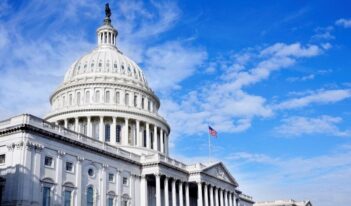
Legislation seeks to reduce friction between federal and state policies for medicinal marijuana use.
Polls show that 78% of Americans believe medical marijuana with a physician recommendation should be legal. Meanwhile, federal law prohibits the sale, possession, production, and distribution of marijuana. However, twenty-three states have “legalized” the use of marijuana for medical purposes, creating conflicts with the federal law.
Newly introduced federal legislation would pave the way for easier access to medical marijuana across the country, although it falls short of fully legalizing it. Senators Cory Booker, Rand Paul, and Kirsten Gillibrand introduced the bipartisan Compassionate Access, Research Expansion, and Respect States Act of 2015 (CARERS Act) If adopted, the bill would amend the Controlled Substances Act of 1970 (CSA) to exempt from the federal ban people who grow, distribute, or use the drug for medical purposes in compliance with state law.
The federal government continues to classify marijuana as a Schedule I narcotic under the CSA. Schedule I drugs are considered the most dangerous drugs with a high potential for abuse; high possibility of severe psychological or physical dependence, or both; and no apparent medical utility. This categorization has hindered more thorough research into the medicinal properties of marijuana. Until last year, only 6% of studies on marijuana analyzed its positive medicinal effects.
As support for medical marijuana grows, federal laws are increasingly in conflict with various state laws permitting medical marijuana. To help alleviate this tension, the proposed CARERS Act includes five major federal policy changes.
First, the bill would amend the CSA so that enforcement of federal marijuana laws no longer takes priority over state laws if they conflict. This amendment would eliminate the fear of federal prosecution for involvement with medical marijuana which is in compliance with relevant state regulations, leaving individual state legislatures free to regulate this use of the substance as they deem fit. Although federal guidance currently urges prosecutors generally to refrain from targeting state-legal marijuana operations, many continue to do so.
Last month, the “Kettle Falls” trial in Washington state highlighted the lack of parity between federal and state policies on medical marijuana. Federal prosecutors charged the Harvey family with multiple felonies for manufacturing, possessing, and distributing marijuana, despite the legality of their actions under state law. The proposed CARERS Act would minimize such federal interference in states that have chosen to legalize medical marijuana.
Second, the bill would reclassify marijuana as a Schedule II narcotic, declaring it to be a less dangerous substance with purported medical benefits. This reclassification would reduce the barriers to research on medical marijuana.
Many scientists maintain that there are at least two active chemicals in marijuana with medicinal applications: cannabidiol, which impacts the nervous system without causing a high, and tetrahydrocannabinol, often referred to as “THC,” which has pain-relieving properties. In 2012, scientists at the California Pacific Medical Center found that cannabidiol could stop metastasis in many kinds of aggressive cancer. A study published the same year in the Journal of the American Medical Association showed that marijuana users had increased lung capacity, which may be attributable to a therapeutic quality of the drug.
Presently, the U.S. Department of Health and Human Services must approve any marijuana research proposal and dictates to an extent how the research is performed. By reclassifying marijuana, the CARERS Act would remove these onerous requirements and deter the U.S. Drug Enforcement Administration from obstructing marijuana research, which it reportedly has done in the past.
Third, the CARERS Act would benefit veterans, as it would allow U.S. Department of Veteran Affairs’ (VA) doctors to prescribe medical marijuana to patients who live in states that have legalized its use. Some commentators have suggested that marijuana may be effective in treating post-traumatic stress disorders commonly suffered by veterans. Yet the VA’s doctors currently cannot prescribe medical marijuana to patients because it is a federally banned drug.
The bill also would make banking services accessible to medical marijuana businesses allowing them to operate as traditional businesses and adding greater legitimacy to such operations. Currently, banks often shut down accounts of marijuana businesses and decline to advance loans out of fear of federal prosecution for aiding illegal drug dealers or money laundering.
Finally, the bill addresses the need to legalize inter-state transport of medical marijuana. It suggests completely removing marijuana with less than 0.3 percent THC from the CSA’s schedules, allowing it to cross state lines legally. Twelve states do not allow the sale or cultivation of marijuana but permit the use of low-THC strains for medical purposes. Currently, residents of these states cannot purchase low-THC marijuana from a state where marijuana is legal to grow, because transporting a federally banned substance across state lines violates federal law.
However, the bill does have its detractors. Last year, former White House National Drug Control Policy adviser and present chair of the anti-marijuana legalization umbrella body Smart Approaches to Marijuana, Kevin Sabet, wrote a letter to the U.S. Department of Justice, the HHS, and the Executive Office of the President arguing against down-scheduling marijuana under the CSA because of the potential for addiction and abuse. Nevertheless, the letter supports facilitating research into potential medical applications of marijuana.
Recently, Representatives Steve Cohen and Don Young introduced an identical bill in the House. So far, both Senate and House versions of the bill have garnered support from Republicans and Democrats. Given increasingly permissive attitudes towards the use of marijuana for medical and recreational purposes, the CARERS Act may well eventually become law.



